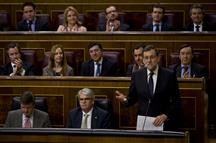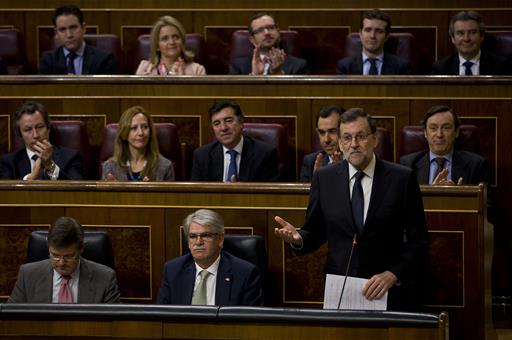"I want to talk about real problems and not about breaking up Spain or the law", says Mariano Rajoy
President's News - 2017.2.22
Lower House of Parliament, Madrid
President of the Government Rajoy declared that the Regional Government of Catalonia should not be "conditioned by extremist groups", because that may affect the economic and social model of Catalonia. He reiterated his interest in negotiating everything that "truly matters to the people of Catalonia" within the framework of the Conference of Regional Presidents, that is, issues such as regional financing, long-term care, employment, infrastructure and investment.
Mariano Rajoy also added that, as President of the Government, he must "uphold the law and see that it is upheld", and hence he cannot "authorise a referendum that, quite simply, seeks to do away with national sovereignty" and prevent "the vast majority" of citizens from choosing what they want "their country to be".
In this regard, he stressed that "now is the time to return to sanity" and common sense, since the last five years "have led to absolutely nothing positive for the people of Catalonia". He also added that "I have the very best intentions and want to talk, but I want to talk about the real problems, not about breaking up Spain and the law".
Pensions
 Pool Moncloa/Diego CrespoDuring the government control session in the Lower House of Parliament, the MP for the PSOE [Spanish Socialist Workers' Party], Antonio Hernando, asked the President of the Government about the purchasing power of pensions. In his reply, Mariano Rajoy underlined that "the rise in pensions is made by applying the law which is currently in force" because that is "what is reasonable" and "the government's obligation".
Pool Moncloa/Diego CrespoDuring the government control session in the Lower House of Parliament, the MP for the PSOE [Spanish Socialist Workers' Party], Antonio Hernando, asked the President of the Government about the purchasing power of pensions. In his reply, Mariano Rajoy underlined that "the rise in pensions is made by applying the law which is currently in force" because that is "what is reasonable" and "the government's obligation".
In this regard, President of the Government Rajoy explained that, according to prevailing legislation, the increase in pensions is applied by taking into account the rise in inflation together with the revenue and expenditure of the system. However, he said that "there will never be a rise of less than 0.25%".
"If revenue rises, pensions will rise more. If revenue drops, pensions will rise less. At any event, there will always be a rise of at least 0.25%", he insisted.
The President of the Government pointed out that the new legislation tackled an unfeasible situation. According to his explanation, the system lost some 70 billion euros between 2007 and 2009, which made it impossible "to maintain public spending at the level Spain had previously enjoyed".
Mariano Rajoy also added that pensions gained in purchasing power in the years 2014-2016 because they rose by 0.25%, while inflation was negative (-0.2% in 2014; -0.5% in 2015 and -0.2% in 2016).
That being said, Mariano Rajoy again invited all the political groups to continue working on the Toledo Pact Committee in order to reach an agreement that guarantees the future of pensions.
Fight against corruption
Pablo Iglesias, from the Unidos Podemos Group, referred to the cases of political corruption. On this issue, the President of the Government recalled that many legal reforms have been approved to prevent this from "happening again in the future". He also recalled that the system is working thanks to the work of the judiciary, public prosecutors, the police and the tax authorities, among others.
At any event, Mariano Rajoy highlighted that "in Spain and in politics there are thousands of people who perform their work very well", who are there "by vocation", and hence do not deserve to "live under a cloud of suspicion", since they perform their duties "with dignity".
Canary Islands
The MP for the Canary Island Coalition, Ana Oramas, asked about the amendments to the Canary Island Economic and Tax Regime. After highlighting that "the commitment of the Government of Spain to the Canary Islands is indisputable", President of the Government Rajoy pointed out that the fiscal aspects of this regime have been amended "with the aim of introducing specific tax incentives that are contributing to the creation of jobs and the economic development of the islands". Pool Moncloa/Diego Crespo
Pool Moncloa/Diego Crespo
The President of the Government also added that the economic aspects of the regime (financing, transport, services, tourism, etc.) are being negotiated at this time and it is his intention to reach an agreement. However, he explained that these negotiations affect many ministerial departments and hence this process "takes time".
According to Mariano Rajoy, the new Canary Island Economic and Tax Regime "will be positive for the people of the Canary Islands and will also benefit the people of Spain in general".





